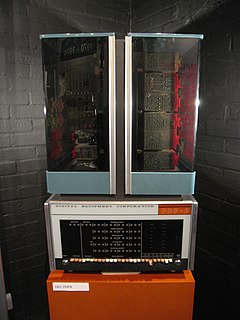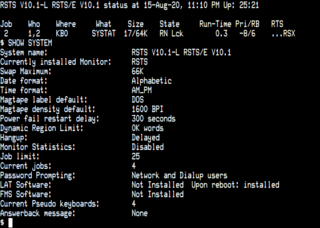
BASIC is a family of general-purpose, high-level programming languages whose design philosophy emphasizes ease of use. The original version was designed by John G. Kemeny and Thomas E. Kurtz and released at Dartmouth College in 1964. They wanted to enable students in fields other than science and mathematics to use computers. At the time, nearly all use of computers required writing custom software, which was something only scientists and mathematicians tended to learn.
In computing, a compiler is a computer program that translates computer code written in one programming language into another language. The name "compiler" is primarily used for programs that translate source code from a high-level programming language to a lower level language to create an executable program.

The PDP-8 is a 12-bit minicomputer that was produced by Digital Equipment Corporation (DEC). It was the first commercially successful minicomputer, with over 50,000 units being sold over the model's lifetime. Its basic design follows the pioneering LINC but has a smaller instruction set, which is an expanded version of the PDP-5 instruction set. Similar machines from DEC are the PDP-12 which is a modernized version of the PDP-8 and LINC concepts, and the PDP-14 industrial controller system.
Maclisp is a programming language, a dialect of the language Lisp. It originated at the Massachusetts Institute of Technology's (MIT) Project MAC in the late 1960s and was based on Lisp 1.5. Richard Greenblatt was the main developer of the original codebase for the PDP-6; Jon L. White was responsible for its later maintenance and development. The name Maclisp began being used in the early 1970s to distinguish it from other forks of PDP-6 Lisp, notably BBN Lisp.
OS/8 was the primary operating system used on the Digital Equipment Corporation's PDP-8 minicomputer.
The Open Letter to Hobbyists is a 1976 open letter written by Bill Gates, the co-founder of Microsoft, to early personal computer hobbyists, in which Gates expresses dismay at the rampant software piracy taking place in the hobbyist community, particularly with regard to his company's software.

RSTS is a multi-user time-sharing operating system, initially developed by Evans Griffiths & Hart of Boston, and acquired by Digital Equipment Corporation for the PDP-11 series of 16-bit minicomputers. The first version of RSTS was implemented in 1970 by DEC software engineers that developed the TSS-8 time-sharing operating system for the PDP-8. The last version of RSTS was released in September 1992. RSTS-11 and RSTS/E are usually referred to just as "RSTS" and this article will generally use the shorter form.
TRACLanguage is a programming language developed between 1959–1964 by Calvin Mooers and first implemented on the PDP-1 in 1964 by L. Peter Deutsch. It was one of three "first languages" recommended by Ted Nelson in Computer Lib. TRAC T64 was used until at least 1984, when Mooers updated it to TRAC T84.
TOPS-10 System is a discontinued operating system from Digital Equipment Corporation (DEC) for the PDP-10 mainframe computer family. Launched in 1967, TOPS-10 evolved from the earlier "Monitor" software for the PDP-6 and PDP-10 computers; this was renamed to TOPS-10 in 1970.

Stephen Russell, also nicknamed "Slug", is an American computer scientist most famous for creating Spacewar!, well known for being the first widely distributed video game.
FOCAL is an interactive interpreted programming language based on JOHNNIAC Open Shop System (JOSS) and mostly used on Digital Equipment Corporation (DEC) Programmed Data Processor (PDP) series machines.
VSI BASIC for OpenVMS is the latest name for a dialect of the BASIC programming language created by Digital Equipment Corporation (DEC) and now owned by VMS Software Incorporated (VSI). It was originally developed as BASIC-PLUS in the 1970s for the RSTS-11 operating system on the PDP-11 minicomputer. It was later ported to OpenVMS, first on VAX, then Alpha, and most recently Integrity.

Hamurabi is a text-based strategy video game of land and resource management. It was first developed under the name King of Sumeria or The Sumer Game by Doug Dyment in 1968 at Digital Equipment Corporation as a computer game for fellow employee Richard Merrill's newly invented FOCAL programming language.
MONECS was a computer operating system with BASIC, COBOL, FORTRAN, Pascal interpreters, plus machine language facility. Specifically designed for computer science education in Australian secondary schools and at the university undergraduate level. Alternative designations were DEAMON or SCUBA systems.

Altair BASIC is a discontinued interpreter for the BASIC programming language that ran on the MITS Altair 8800 and subsequent S-100 bus computers. It was Microsoft's first product, distributed by MITS under a contract. Altair BASIC was the start of the Microsoft BASIC product range.

Kenneth Lane Thompson is an American pioneer of computer science. Thompson worked at Bell Labs for most of his career where he designed and implemented the original Unix operating system. He also invented the B programming language, the direct predecessor to the C programming language, and was one of the creators and early developers of the Plan 9 operating system. Since 2006, Thompson has worked at Google, where he co-developed the Go programming language.
The history of the programming language Scheme begins with the development of earlier members of the Lisp family of languages during the second half of the twentieth century. During the design and development period of Scheme, language designers Guy L. Steele and Gerald Jay Sussman released an influential series of Massachusetts Institute of Technology (MIT) AI Memos known as the Lambda Papers (1975–1980). This resulted in the growth of popularity in the language and the era of standardization from 1990 onward. Much of the history of Scheme has been documented by the developers themselves.
Mainframe computers are computers used primarily by businesses and academic institutions for large-scale processes. Before personal computers, first termed microcomputers, became widely available to the general public in the 1970s, the computing industry was composed of mainframe computers and the relatively smaller and cheaper minicomputer variant. During the mid to late 1960s, many early video games were programmed on these computers. Developed prior to the rise of the commercial video game industry in the early 1970s, these early mainframe games were generally written by students or employees at large corporations in a machine or assembly language that could only be understood by the specific machine or computer type they were developed on. While many of these games were lost as older computers were discontinued, some of them were ported to high-level computer languages like BASIC, had expanded versions later released for personal computers, or were recreated for bulletin board systems years later, thus influencing future games and developers.
In computer programming, self-hosting is the use of a program as part of the toolchain or operating system that produces new versions of that same program—for example, a compiler that can compile its own source code. Self-hosting software is commonplace on personal computers and larger systems. Other programs that are typically self-hosting include kernels, assemblers, command-line interpreters and revision control software.
BASIC-8, is a BASIC programming language for the Digital Equipment (DEC) PDP-8 series minicomputers. It was the first BASIC dialect released by the company, and its success led DEC to produce new BASICs for its future machines, notably BASIC-PLUS for the PDP-11 series. DEC's adoption of BASIC cemented the use of the language as the standard educational and utility programming language of its era, which combined with its small system requirements, made BASIC the major language during the launch of microcomputers in the mid-1970s.






